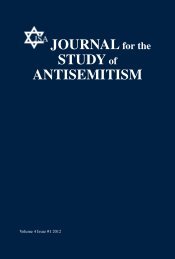JOURNALfor the STUDYof ANTISEMITISM
JOURNALfor the STUDYof ANTISEMITISM
JOURNALfor the STUDYof ANTISEMITISM
Create successful ePaper yourself
Turn your PDF publications into a flip-book with our unique Google optimized e-Paper software.
142 JOURNAL FOR THE STUDY OF <strong>ANTISEMITISM</strong> [ VOL. 3:141<br />
Hizbollah and <strong>the</strong> 2009 Israel-Hamas wars, when virulent antisemitic hostility,<br />
disguised as “anti-Zionism,” reached its peak.<br />
This context is providing an appealing opportunity for <strong>the</strong> radical Iranian<br />
regime in its search for new allies that could help to combat its<br />
isolation.<br />
“21ST-CENTURY SOCIALISM”—OR <strong>ANTISEMITISM</strong>?<br />
Most of <strong>the</strong> Latin American groups active at <strong>the</strong> forums find <strong>the</strong>ir<br />
political reference in <strong>the</strong> ALBA (Bolivian Alternative for <strong>the</strong> Americas) 1<br />
bloc, led by Venezuela’s Húgo Chávez and joined by Evo Morales<br />
(Bolivia), Rafael Correa (Ecuador), Daniel Ortega (Nicaragua), and Fidel<br />
and Raul Castro (Cuba). This bloc is also <strong>the</strong> main partner for <strong>the</strong> growing<br />
Iranian penetration in Latin America.<br />
It is interesting that all of <strong>the</strong>se leaders have reached power by building<br />
<strong>the</strong>ir legitimacy from outside <strong>the</strong> traditional political systems and/or in<br />
connection to institutional crisis in <strong>the</strong>ir countries: Chávez is an army colonel<br />
whose first attempt to get to <strong>the</strong> presidency was a failed coup d’etat;<br />
Morales was a leader of indigenous peasants working at coca plantations;<br />
Correa is <strong>the</strong> first stable Ecuadorian president in years; Ortega and <strong>the</strong> Castro<br />
bro<strong>the</strong>rs were leaders of armed revolutions, although Ortega later ran for<br />
and won free elections. All of <strong>the</strong>m have also provided a warm reception to<br />
Iranian President Mahmoud Ahmadinejad and have established diverse<br />
cooperation initiatives.<br />
In <strong>the</strong> case of Bolivia, beyond <strong>the</strong> common interests regarding energy<br />
resources, Iran has also financed humanitarian projects. A new hospital,<br />
named “Islamic Republic of Iran—The Red Crescent Society,” was inaugurated<br />
by presidents Morales and Ahmadinejad in November 2009. The hospital<br />
provides health services for over 800,000 people of El Alto, a modest<br />
neighborhood, 40 minutes away from <strong>the</strong> capital city, La Paz, and home to<br />
a wide constituency of President Morales. 2 But beyond Iran’s generosity, a<br />
controversy arose with <strong>the</strong> suggestion that nurses and o<strong>the</strong>r female staff<br />
wear a veil while on duty. 3<br />
1. The acronym ALBA was created by Húgo Chávez as a counter to <strong>the</strong> ALCA<br />
(Área de Libre Comercio de las Américas—FTAA, <strong>the</strong> U.S. initiative for a Free<br />
Trade Agreement of <strong>the</strong> Americas). In Spanish, <strong>the</strong> word “alba” means “dawn,” so<br />
<strong>the</strong> bloc’s name is intended to proclaim a “new era” for Latin America.<br />
2. “Se afianzan los vínculos con Irán,” La Nación, December 6, 2009, http://<br />
www.lanacion.com.ar/1208421-se-afianzan-los-vinculos-con-iran.<br />
3. “Velo islámico en Bolivia,” http://www.bbc.co.uk/mundo/america_latina/<br />
2009/11/091126_2328_bolivia_islam_gm.shtml.














